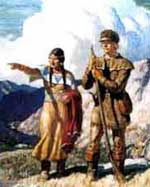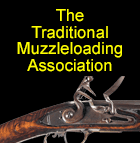News:
Post your reenacting photos for FREE in our photo gallery! Let the world see your great impression!
Frontier Era Bookstore
& Reading List
Here, we hope you will find some further reading on this period and possibly even buy a book from us! As we go along, we will be adding more and more books (and movies) through our association with Amazon.com. Why buy here? Well... in buying a book through us, you help support reenactor.Net (and our surprisingly HIGH server bill) AND keep the site free. As we have just revamped this area, we are in the process of setting this up now.
If you have a book that you think that we should list, please click here.
Reenacting and Living History Resources | Historical Accounts and Biographies
Native American Studies | Military Books | Multimedia
Reenacting and Living History Resources |
|
|
|
A Pilgrim's Journey by Mark A. Baker -- This book is a compilation of the first ten years of Mark Baker's column from Muzzleloader Magazine.
I don't know about you, but I have been a fan of Baker's for years... his ideas and articles are not only useful for his time-period, they also translate well to other time periods. Mark Baker truly IS one of the leading lights of "Experimental Archeology." A Pilgrim's Journey contains over 300 pages of treks, scouts, hunts and how-to. Baker shares his knowledge and insights gained from wilderness experiences, extensive research, and from his partners and mentors along the way. Join Mark as he takes his pilgrim's journey back to the 18th century frontier. From flintlocks and moccasins to shooting bags and knapsacks, Baker explores the way of life of the Colonial woodsman. Learn about the clothing, accoutrements, food and skills from an era that helped forge the American Spirit and a new nation. Softcover. 306 pages with over 250 quality illustrations and photos, including many new photos in and updated layout. |
|
|
A Pilgrim's Journey Volume Two by Mark A. Baker -- This book is a compilation of the next ten years of Mark Baker's column from Muzzleloader Magazine.
Join Mark as he continues his pilgrim's journey back to the 18th century frontier. From flintlocks and moccasins to shooting bags and knapsacks, Baker explores the way of life of the Colonial woodsman. Learn about the clothing, gear, food and skills from an era that helped forge the American spirit and a new nation. |
|
|
Tidings from the 18th Century -- A great book that will help anyone with their 18th Century impression. Not only that, any impression of the Frontier era will be helped by reading this material. Not only does it show you things like sewing techniques, but also other crafts and it does so in a period manner. I can't say enough good things about this book!
Buy it! |
|
|
Book of Buckskinning -- Step back in time and learn how to relive the American frontier. First published in 1981, this bestseller is the standard against which other frontier living history books are judged. Ten authors bring their expertise to the subjects of The Philosophy of Buckskinning, How to Get Started, Rendezvous & Shoots The Lodge, The Guns, The Clothing, Accoutrements & Equipment, The Skills, Women in Buckskinning and The Crafts. 208 pages. |
|
|
Book of Buckskinning II -- More in-depth information on how to re-create life on the American frontier. Techniques, patterns and instructions for everyday work and living in the wilderness. Chapters include Why Buckskinners Create, Working with Leather, 18th Century Clothing, Horseback Travel, Design and Construction of Powder Horns, Firemaking, Traveling Afoot & By Canoe, Making Camp Gear and Gun Tune-Up & Care. 264 pages. |
|
|
Book of Buckskinning III -- Solid buckskinning information written by the most knowledgeable people in buckskinning. Subjects include Historic Guns & Today's Makers, Quillworking, Trade Beads, 18th & l9th Century Cooking, The Hunting Pouch, Beadworking, Techniques for Making Footwear and Period Shelters. Also includes a special color section showing beadwork, quillwork, authentic frontier outfits and trade beads. 240 pages. |
|
|
Book of Buckskinning IV -- Add to your knowledge and enhance your buckskinning lifestyle and skills with chapters on Traditional Blacksmithing, Blankets in Early America, From Raw Hides to Rawhide, Styles of the Southwest, Smoothbores on the Frontier, Trade Silver, Backwoods Knives, Lighting the Primitive Camp and Historic Sites & Museums. 260 pages. |
|
|
Book of Buckskinning V -- Continues the buckskinning series of practical frontier living skills with chapters on Fur Trade Indian Dresses, Old-Time Music & Instruments, Trade Goods for Rendezvous, Tipi Know-How, Engraving & Carving, Historic Sites & Museums II, Games, Sports & Other Amusements and Pack Saddles & Panniers. A special color section features the dress of fur trade Indian women and horseback photos. 260 pages. |
|
|
Book of Buckskinning VI -- The sixth book in our buckskinning series continues the tradition of first rate historical information and hands-on frontier craft skills. Chapters include The Traditional Hunting Pouch, Horse Gear, East & West, Making a Wooden Bow, American Powder Horns, Frontier Trail Foods, Old-Time Shooting Matches, Period Trekking and Finger Weaving. Color section features horseback trips, powder horns, hunting pouches and fingerwoven sashes. 226 pages. |
|
|
The Book of Buckskinning VII -- Buckskinning VII continues the tradition of first-rate historical information and hands-on frontier craft skills. Chapters include Clothing of the Rocky Mountain Trapper, 1820- 1840; Indian-influenced Woodsmen of the Cane; Tools & Techniques of Bark Tanning; A Wardrobe for the Frontier Woman, 1780-1840; A Typical Day's Journey in Winter; Goods of the Trunk Maker & His Trade; Art & Writing on the Frontier and Great Lakes & Eastern Woodlands Knife Sheaths. Color section features original art and artifacts plus reproductions. 260 pages. |
|
|
The Book of Buckskinning VIII -- Continuing the Buckskinning series with another book with first-rate historical information and hands-on frontier craft skills. Chapters include: Gear of the Rocky Mountain Trapper, Beaver Hunting, Wing Shooting with a Flintlock Shotgun, History of the Horse in the Fur Trade, 18th Century Tatooing, The History & Trade Ledgers of Fort Hall, Independent Women of America's Past, Beadwork in the American West before 1850, and The Evolution of the Cocked Hat. |
|
|
Firearms, Traps and Tools of the Mountain Men by Carl P. Russell -- This encyclopedic guide to the equipment of the trappers and fur traders who opened the Old west is a unique reference work that can be classified either as a history or as archaeology. It describes and discusses hundreds of iron artifacts - rifles, shotguns, hatchets, axes, knives, traps, and miscellaneous tools - used by the mountain men from the early 1800s to the mid 1840s. Illustrated with over 400 drawings, the book begins with a useful background history of the western fur trade. The book will send every frontier buff scurrying to re-examine his rusty treasures, and every museum of western lore to set up new exhibits. |
|
|
Last Stand at Old Man's Creek by Eugene C. Stevens -- In the spring of 1832, 275 Illinois militiamen under the command of Major Isaiah Stillman were sent on a mission to capture or destroy the infamous Chief Black Hawk and subdue the warriors that followed him into Illinois to reclaim their homeland. Stillman?s expedition earned the title of the ?Forlorn Hope,? as they found themselves up against superior numbers of warriors with the very real possibility of being completely wiped out. A small contingent of Rangers held their ground and covered the retreat of their fellow Rangers. Many lost their lives, but many others lived to tell the truth about what had really occurred on that day. Last Stand at Old Man?s Creek is the true and correct story of what occurred and the aftermath of the battle that would smear the names of the men who were there. This finally answers the questions that have lingered for nearly two centuries about the circumstances surrounding the surprising defeat of the militia on that fatal day. |















